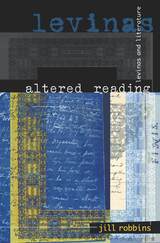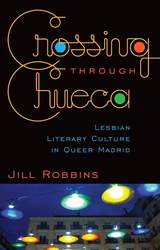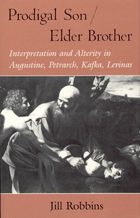3 books about Robbins, Jill

Altered Reading
Levinas and Literature
Jill Robbins
University of Chicago Press, 1999
How might the ethical philosophy of the renowned French thinker Emmanuel Levinas relate to literature? Because his philosophy addresses the very opening of ethical experience, it cannot be applied readily as a critical method to literary texts. Yet Levinas's work, studded as it is with literary sources and quotations, demands a literary account.
With an attitude at once respectful and interrogative, closely attentive to Levinas's texts while in dialogue with readings by Derrida, Blanchot, and Bataille, Altered Reading shows how the thread of the literary leads directly to the internal tensions of Levinas's ethical discourse. Jill Robbins provides a comprehensive critical account of Levinas's early and mature philosophy as well as later key transitional essays. In an invaluable appendix, she includes her own translation of an important, previously untranslated essay by Bataille on Levinas.
Altered Reading will interest philosophers, literary critics, scholars of religion, and others drawn to Levinas's work.
With an attitude at once respectful and interrogative, closely attentive to Levinas's texts while in dialogue with readings by Derrida, Blanchot, and Bataille, Altered Reading shows how the thread of the literary leads directly to the internal tensions of Levinas's ethical discourse. Jill Robbins provides a comprehensive critical account of Levinas's early and mature philosophy as well as later key transitional essays. In an invaluable appendix, she includes her own translation of an important, previously untranslated essay by Bataille on Levinas.
Altered Reading will interest philosophers, literary critics, scholars of religion, and others drawn to Levinas's work.
[more]

Crossing through Chueca
Lesbian Literary Culture in Queer Madrid
Jill Robbins
University of Minnesota Press, 2010
In the past two decades the city of Madrid has been marked by pride, feminism, and globalization—but also by the vestiges of the machismo nurtured during the long years of the Franco dictatorship. Crossing through Chueca examines how lesbian literary culture fares in this mix from the end of the countercultural movement la movida madrileña in 1988 until the gay marriage march in 2005.
Jill Robbins traverses the various literary spaces of the city associated with queer culture, in particular the gay barrio of Chueca, revealing how it is a product of interrelations—a site crisscrossed by a multiplicity of subjects who constitute it as a queer space through the negotiation of their sexual, racial, gender, and class identities. Robbins recognizes Chueca as a political space as well, a refuge from homophobia. She also shows how the spatial and literary practices of Chueca relate to economic issues.
In examining how women’s sexual identities have become visible in and through the Chueca phenomenon, this work is a revealing example of transnational queer studies within the broader Western discussion on gender and sexuality.
[more]

Prodigal Son/Elder Brother
Interpretation and Alterity in Augustine, Petrarch, Kafka, Levinas
Jill Robbins
University of Chicago Press, 1991
"I don't know of any other book that deals with the hermeneutical problem of the relationship between Christianity and Judaism in the way this one does. Full of cunning and unpredictable turns, Prodigal Son/Elder Brother addresses the question of the elder brother's fate by opposing two sets of readings, Christian and Jewish, ancient and modern, figural and midrashic. No one, after reading this book, will any longer connect Judaism and Christianity with a hyphen."—Gerald L. Burns, University of Notre Dame
"Through a creative reading of the prodigal son parable, Jill Robbins demonstrates the hermeneutical impasse of the Christian exegete who must and yet cannot incorporate the Old Testament. Having disclosed the aporia at the heart of Christian hermeneutics, she proposes an alternative approach to the Hebrew Bible and new interpretations of Augustine, Petrarch, Kafka, and Levinas. Robbins brilliantly integrates the discourses of biblical texts, literary works, and critical analysis."—Mark C. Taylor, Williams College
"Through a creative reading of the prodigal son parable, Jill Robbins demonstrates the hermeneutical impasse of the Christian exegete who must and yet cannot incorporate the Old Testament. Having disclosed the aporia at the heart of Christian hermeneutics, she proposes an alternative approach to the Hebrew Bible and new interpretations of Augustine, Petrarch, Kafka, and Levinas. Robbins brilliantly integrates the discourses of biblical texts, literary works, and critical analysis."—Mark C. Taylor, Williams College
[more]
READERS
Browse our collection.
PUBLISHERS
See BiblioVault's publisher services.
STUDENT SERVICES
Files for college accessibility offices.
UChicago Accessibility Resources
home | accessibility | search | about | contact us
BiblioVault ® 2001 - 2024
The University of Chicago Press









